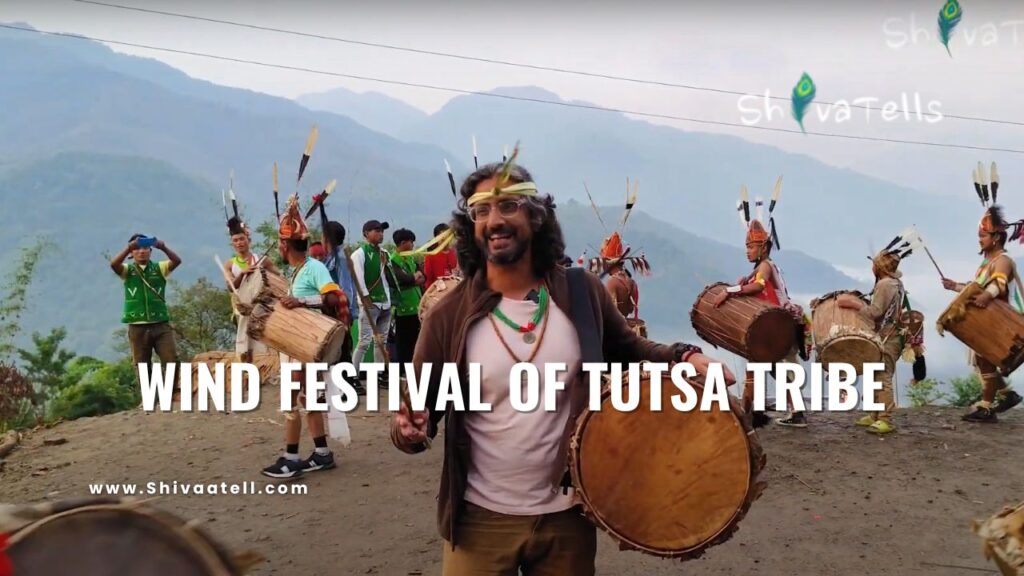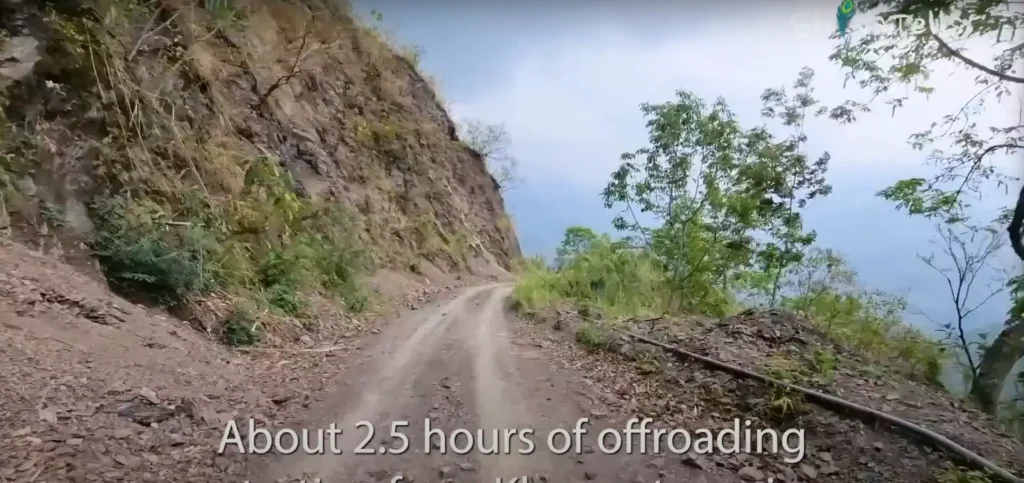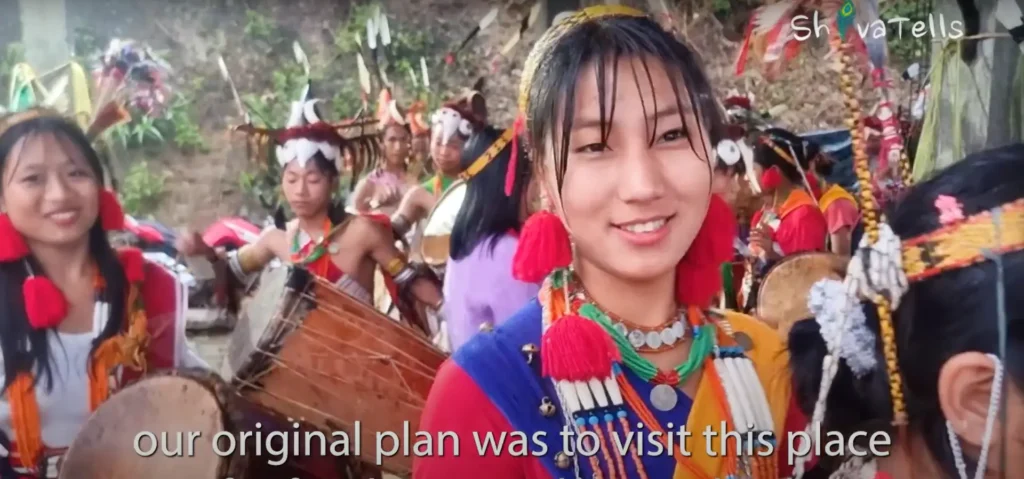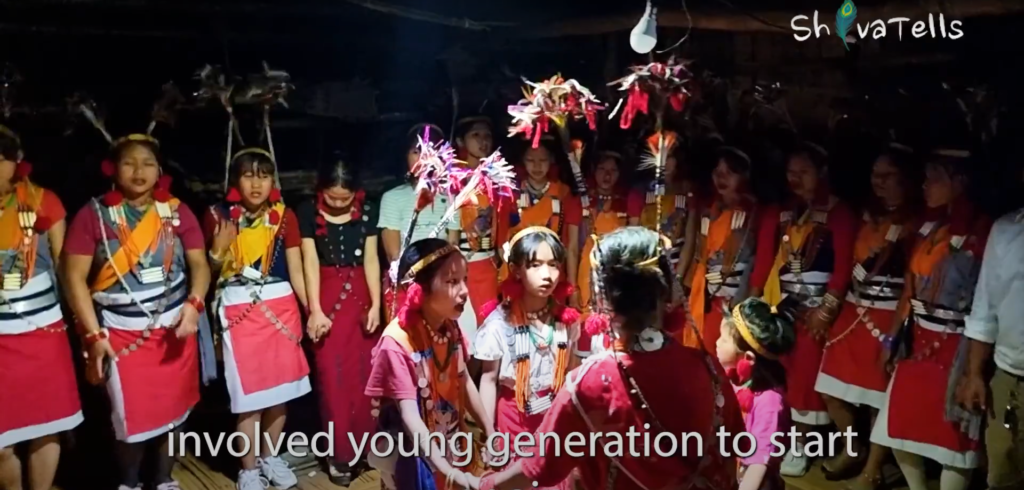Introduction
I’m sure the rain will pour down today, just like it did on that unforgettable journey. Let me tell you about a beautiful, yet largely undiscovered place where the wind carries the sound of ancient drums, and the people celebrate with all their hearts. This is the story of the Pongtu Festival, celebrated by the Tutsa tribe in Tutnu village, nestled deep in the hills near the Myanmar border.
The journey to this village was as exciting as the destination itself. Accompanied by my friend Kuntik, we set out on an off-road adventure, about 2.5 hours from Konsa town in Tirup District. What awaited us was an experience that would not only mesmerize us but also change how we viewed local festivals forever. Let’s begin this journey together.

Table of Contents
Off-Road Adventure to Tutnu Village

The off-roading experience leading to Tutnu was as thrilling as you can imagine. It was a bumpy, adrenaline-filled ride, where the rugged beauty of the hills unfolded before us. Tutnu, a name that translates to “mother of tutsa people,” holds deep significance for the Tutsa tribe, as their origins are believed to trace back to this very hill.
As we ventured deeper into the hills, the air grew fresher, and the untouched wilderness around us felt almost surreal. The village of Tutnu, hidden away from the hustle of modern life, had never been explored by tourists, adding to the sense of mystery and wonder. We didn’t know it yet, but our plans of staying for a few hours would soon stretch into two full days of celebration, hospitality, and cultural immersion.
How to Reach Tutnu Village from Itanagar

Reaching Tutnu village from Itanagar, the capital of Arunachal Pradesh, is an adventure in itself. Here’s a step-by-step guide to help you navigate the journey:
- By Road (Itanagar to Konsa)
- Distance: Itanagar to Konsa is approximately 450-500 km.
- Travel Time: The drive will take around 15-18 hours, depending on road conditions. It’s advisable to split the journey into two days, with a stopover in towns like Khonsa or Longding.
- Route:
- From Itanagar, take NH13 towards Ziro, then follow NH 315A towards Dibrugarh in Assam.
- After crossing into Arunachal Pradesh again, head towards Khonsa, the district headquarters of Tirap.
- From Khonsa, follow the local road to Konsa, which is the nearest town to Tutnu village.
- Public Transport: Buses and shared taxis are available from Itanagar to Khonsa, but for the final leg to Konsa, it’s best to hire a private vehicle or taxi.
- Konsa to Tutnu Village
- Distance: Start your journey from Konsa, a small town in Tirup District, Arunachal Pradesh. It’s about 2.5 hours from Tutnu by off-road vehicle. Make sure you have a sturdy vehicle, as the terrain can be rough.
- Road Conditions: The road from Konsa to Tutnu is rugged, so a 4×4 vehicle is recommended. The drive is adventurous, with scenic landscapes and hilly terrain.
- Local Guide: It’s advisable to hire a local guide from Konsa who knows the terrain well and can navigate the off-road tracks.
- Tips for the Journey:
- Pack Light: Carry essentials like water, snacks, rain gear, and sturdy shoes.
- Fuel Up: Ensure your vehicle is fueled up in Konsa, as there are no fuel stations near Tutnu.
- Accommodation: Since Tutnu is a remote village, there are no hotels. However, villagers will warmly offer homestays. Be prepared for a rustic experience and make arrangements beforehand if possible.
With these steps, you’ll be well on your way to exploring the untouched beauty and rich culture of Tutnu Village!
A Warm Welcome Like No Other

The Pongtu Festival, or the “season of air,” is the annual celebration of the Tutsa tribe. Though it’s celebrated by the whole community, it feels as if the festival is personally curated for each visitor. As we arrived at the village, we were greeted by an overwhelming sense of hospitality. Every home we passed invited us inside with open arms, offering food, drinks, and stories. The genuine warmth of the people was truly heartwarming.
We quickly realized that this was no ordinary festival. Our original plan of staying for a few hours soon dissolved as we became immersed in the celebrations. The locals refused to let us leave, insisting that we join them in their festivities for the next two days. Who were we to say no to such heartfelt hospitality?
The Importance of Pongtu Festival – The Festival of Wind

The Pongtu Festival is more than just a celebration; it is a deep-rooted cultural tradition that holds significant importance for the Tutsa tribe. Celebrated annually on April 11th, though some villages extend it between April and June, Pongtu marks the beginning of the rainy season, a time of renewal and blessings.
The festival is observed to:
- Strengthen Tribal and Clan Solidarity: Pongtu fosters unity among the tribe members, bringing together families, clans, and even neighboring villages in a shared celebration of heritage and tradition.
- Celebrate the New Year: For the Tutsa tribe, Pongtu represents the start of a new cycle, much like a New Year’s celebration, where the past is honored and new beginnings are embraced.
- Drive Out the Old: The festival is seen as a symbolic farewell to the past year, ridding the community of old grievances, hardships, and misfortunes.
- Ask for Blessings: One of the key elements of the festival is offering prayers for the millet crops in the Jhoom fields, asking for favorable rains and a bountiful harvest for the upcoming season.
Pongtu is, at its core, a festival of renewal and resilience, reminding the Tutsa people of their connection to nature, community, and ancestral traditions.
The Sound of Drums: The Heartbeat of Pongtu Festival
The first two days of the Pongtu Festival are primarily celebrated at night, and what a celebration it is! The men of the village gather around with their handmade drums, crafted from goat skin, and the rhythmic thumping fills the air. The sound is so invigorating that it feels like the pulse of the village itself. The drums never stop, reverberating through the night, keeping the energy alive.
It’s not just the men who are involved; the women and girls form dance groups, moving gracefully to the beat of the drums. They sing traditional chants that tell stories of their ancestors and the events of the past year. This beautiful tradition of storytelling through music and dance made me lose track of time entirely. Before I knew it, the sun had risen, and the night had melted into a fresh new day.
A Taste of Apang and Tutsa Hospitality
After a long night of dancing, drumming, and chanting, we were invited for a glass of Apang, the local rice beer. Now, in Tutnu, declining such an offer is simply not an option. With every sip of Apang, I felt even more connected to the spirit of the festival and the people of this remote village. It was a small yet significant gesture of friendship and community.
Later, we rested for a few hours, only to rise and prepare for the final day of the Pongtu celebration. By this point, I was completely captivated by the way this community came together through their ancient rituals, and I couldn’t wait to see what else the festival had in store for us.
The Final Day: Celebrating with the Village
On the final day of the Pongtu Festival, the whole village, young and old, comes together. The men and women march through the village with their drums, while the rain softly falls, as if nature itself was part of the celebration. The weather didn’t dampen anyone’s spirits; in fact, it only added to the magic of the moment.
As evening approached, we were invited to the king’s house for an exclusive gathering. There, under the shelter of the royal home, we enjoyed an evening filled with more chanting, dancing, and drumming. The atmosphere was electric, and the night ended with a delicious dinner served by the princess herself. The flavors of the local cuisine were unlike anything I had tasted before, and the experience of dining with the royal family was nothing short of surreal.
The Importance of Preserving Tradition

While I was deeply engrossed in the festival’s energy, I was surprised to learn that the Pongtu Festival had not been celebrated for almost 25 years. It’s a sobering thought – how quickly traditions can be lost when the younger generation doesn’t realize their value.
Thankfully, this year’s festival was a revival, a spark of hope that the traditions of the Tutsa tribe will continue to thrive for generations to come. Witnessing this renewed effort to preserve their culture made me reflect on how important it is for us all to stay connected to our roots and heritage. Pongtu was not just a festival; it was a living reminder of the tribe’s past, present, and future.
How to Join the Pongtu Festival

- When to Visit: Pongtu is celebrated annually, usually in the month of April. Check with locals or travel guides to confirm the dates.
- Stay with Locals: There are no hotels in Tutnu, but the villagers are incredibly welcoming and will offer you accommodation in their homes. Be prepared to experience their hospitality firsthand.
- What to Expect: The Pongtu Festival is a celebration of drums, dances, chants, and stories. It’s a cultural immersion like no other. Be ready for sleepless nights filled with vibrant energy, as the drums play on until dawn.
- Bring a Gift: As is customary, bring a small gift when you visit a home, whether it’s food, clothing, or something from your own culture. It’s a great way to show appreciation for their warm welcome.
Final Thoughts
As I sit here reminiscing about the Pongtu Festival, the sound of drums still echoes in my mind. It’s hard to put into words just how transformative this experience was. From the off-road adventure to the heartfelt hospitality, from the thumping drums to the mesmerizing chants, Tutnu and its people left an indelible mark on my heart.
If you’re looking for a journey that’s as much about self-discovery as it is about cultural exploration, I invite you to join the Pongtu Festival next year. Trust me, it will be a celebration you’ll never forget.
Until next time, stay curious, keep exploring, and remember, the world is full of hidden gems waiting to be discovered. Happiness always!
Read Tribe Festival Stories –
- The Judima Festival – Dima Hasao’s Hidden Rice Beer Festival!
- Tah Thavan: A Uniquely Female Festival in Arunachal Pradesh’s Wancho Tribe
Watch Travel stories –
